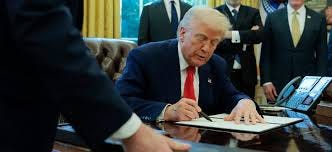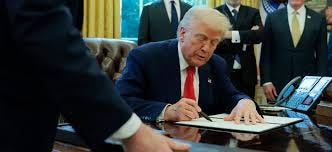Order Up...
Last week President Trump signed an executive order instructing the Justice Department to investigate two people from his first presidency who have been critical of the President.
Justice Briefs is a weekly newsletter devoted to federal criminal prosecution. The federal government’s evolution over the last 230 years has given federal prosecutors significant discretion. Few realize it exists and even fewer know how it is used. Justice Briefs aims to make federal prosecutions and prosecutors more accessible to the general public. Please help me in this endeavor by subscribing and sharing with others.
Justice in Brief
In the Eastern District of New York, a man was sentenced to pay a $900,000 fine for possessing hundreds of endangered birds mounted for display and rare bird eggs. He possessed them in violation of the Endangered Species Act.
In the Western District of Pennsylvania, a man was charged with threatening to kill the President and other federal officials in YouTube videos he posted online.
In the Eastern District of Missouri, a man was charged with murder in the aid of racketeering, a RICO conspiracy, and using a firearm during a crime of violence. The man was identified as a member of a violent St. Louis gang.
Updates…
The Justice Department continues reshaping its priorities. Regulating cryptocurrency had been a significant priority of Merrick Garland’s Justice Department. While the Department will continue prosecuting such cases, enforcement units will be focused on other topics. In a related action, the Justice Department will focus on preserving gun rights over prosecuting weapons offenses.
US Attorney for the District of New Jersey, Alina Habba announced that she would initiate an investigation into New Jersey’s Governor and Attorney General for obstructing law enforcement and harboring illegal aliens for their role in enforcing New Jersey’s Immigrant Trust Directive.
Now serving…retribution
The transformation of the Justice Department continued last week as President Trump signed an executive order instructing the Justice Department to investigate Chris Krebs and Miles Taylor, two people who served during the President’s first administration. This is the first time the President has directly ordered the Justice Department to investigate a political enemy. How the Department of Justice responds will provide significant insight into its future under Attorney General Bondi and President Trump. Perhaps surprisingly, however, it is not the first time a President has directed people be prosecuted.
On April 9, the President signed Executive Orders entitled “Addressing Risks from Chris Krebs and Government Censorship” and “Addressing Risks Associated with an Egregious Leaker and Disseminator of Falsehoods.” The first focuses on Chris Krebs who, during the first Trump presidency, served as the Director of the Cybersecurity and Infrastructure Agency. His agency played a significant role in assisting states secure the 2020 election from fraud and cyberintrusions. He also testified during the January 6 Commission investigation that the elections were honest and fair. The second focuses on Miles Taylor. Taylor served as Chief of Staff to the Secretary of Homeland Security during President Trump’s first administration and anonymously wrote articles and a book about the president’s conduct. When the article first appeared in 2018, President Trump ordered a thorough investigation to discover the source of the leak. It was not until 2020 that Taylor identified himself as the author.
The text of the two orders differ slightly but comments made at the signing by a Trump aid and the President himself reveal that both have the same intent. The Krebs order accuses him of censoring conservative speech during the COVID pandemic and the 2020 election. Without facts, the order alleges that Krebs:
“Promoted the censorship of election information, including known risks associated with certain voting practices.”
“Falsely and baselessly denied that the 2020 election was rigged and stolen, including by inappropriately and categorically dismissing widespread election malfeasance and serious vulnerabilities with voting machines.”
“Skewed the bona fide debate about COVID-19 by attempting to discredit widely shared views that ran contrary to CISA’s favored perspective.”
The order then revokes any security clearance Krebs holds, revokes the clearances held by Krebs’ company, and orders a review into CISA’s operations over the last six years.
Like the Krebs order, the Taylor order identifies several allegations.
“Stoked dissension by manufacturing sensationalist reports on the existence of a supposed “resistance” within the Federal Government that “vowed” to undermine and render ineffective a sitting President.”
“Published classified conversations to sell his book under the pseudonym “Anonymous,” which is full of falsehoods and fabricated stories.”
The order explained “this conduct could properly be characterized as treasonous and as possibly violating the Espionage Act…” The Order revokes any security clearances Taylor holds and extends to anyone at the University of Pennsylvania, where Taylor is employed. It also directs DHS to investigate Taylor’s conduct and report its findings.
The signing statements make more reference to criminal investigation. The President said he believes that Taylor’s conduct was treasonous but “we will find out.” The President also said, regarding Krebs, that Krebs “used COVID” to cheat in the election” and that “we will find out about this guy, too.”
The question now becomes what happens next. Though never explicitly stated in the order’s text, media on both sides of the political spectrum interpreted the orders and corresponding presidential statements as ordering a Justice Department investigation. When making reference to “treasonous,” “Espionage Act,” and “cheat in the election,” one immediately thinks a criminal investigation will result. Should such an investigation occur, one wonders what federal investigators will discover.
Will the Justice Department, through the FBI and federal prosecutors, conduct this investigation? Will it occur quickly? The answers to these questions will reveal much about Attorney General Bondi’s promise to the Senate Judiciary Committee that politics will play no role in Justice Department decisions.
The question all of this raises is whether the president can order the Justice Department to investigate specific individuals. Despite norms established after Watergate, the answer, based on historical precedent, is that the President can order an investigation and prosecution. The first instance occurred at the end of President Washington’s first term. Treasury Secretary Alexander Hamilton’s whiskey tax angered people living on the United States’ western frontier—at that time the Appalachian Mountains. They vigorously protested the tax in the early fall of 1792. Hamilton, upon reading reports of the protest, asked Attorney General Edmund Randolph whether the activities were prosecutable. Randolph read various news stories about the protests and found that the conduct fell within the First Amendment’s protection.
Not to be deterred, Hamilton ultimately prevailed as indictments were planned for the next term of the federal circuit court in Pennsylvania. Anticipating the indictments from the grand jury, Washington instructed Randolph,
It is highly important that the proceedings in the Indictments of those who have opposed themselves, unwarrantably, to the Laws laying a duty on distilled spirits, should be placed on legal ground & prosecuted properly; it is my desire therefore that you will attend the Circuit Court at York Town, to be holden the [ ] of this Month and see that, that business is conducted in a manner to which no exception can with propriety be taken: and for the further purpose also of giving to this measure of Government a more solemn & serious countenance aspect.
Sure enough, the grand jury at York, Pennsylvania, indicted two people for their role in protest activity. For want of time, the court continued the case until the spring of 1793. Interestingly enough, prior to the next court date, Washington wrote to William Rawle, the United States Attorney for Pennsylvania and instructed Rawle to dismiss the cases due to a case of mistaken identity. No further prosecutions resulted until the more violent protests of 1794.
Washington’s two immediate successors followed his precedent and also ordered investigations and prosecutions. John Adams did so when he received word that a newspaper had printed British diplomatic correspondence. Thomas Jefferson did so when he learned that his former Vice President, Aaron Burr, was plotting military action near Louisiana.
As these precedents demonstrate, the President has the power to order investigations and prosecutions. Just because the President has this power, however, does not mean the President should exercise it to its full extent. Giving the President power to order prosecutions leaves open the possibility of abuse. On the surface, the orders against Krebs and Taylor seem closer to the abuse side of the spectrum. Despite the President’s beliefs, no credible evidence has emerged that anything improper occurred in the 2020 election. Taylor has the right to publish a book about his experiences as a government official and may criticize the work the government performed. The President himself won election doing the exact thing he accuses Taylor of doing, even to the extent of disclosing national security information.
Whether these orders are an abuse of power is a matter for determination. Will the Justice Department simply forget about them? This seems unlikely as Attorney General Bondi’s initial actions follow all orders from the President. Will the Justice Department find the evidence sufficient to initiate a prosecution? This cannot be answered yet but much hinges on the word “sufficient.” The government only needs probable cause to initiate charges. Will they file charges and then dismiss them later in order to extract some concession? Or just simply to humiliate Krebs and Taylor? Post-Watergate Justice Departments would not act in this manner. As others have noted, the Bondi Justice Department is taking a different approach. Securing criminal convictions does not seem to be the top priority.
Ultimately, this is just the first step in a longer process. It provides initial clues as to whether the Justice Department will use criminal prosecution as a political tool. Where it will end remains to be seen.
I hope you enjoyed this issue and that it made you stop and think. I would love to hear any comments, questions, concerns, or criticisms that you have. Leave a comment or send a message! Also, if you enjoyed this or if it challenged your thinking, please subscribe and share with others!



